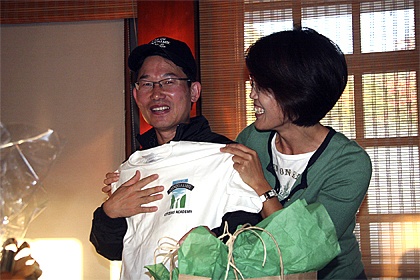After more than year of work, life and study in the Snoqualmie Valley, the Mun family departed for their home country of Korea, taking with them the symbols and souvenirs of their adopted home.
Charlie, 13, brought his baseball bat, mitt and fishing pole. Father Young Hoon had a sketch of Snoqualmie Falls by Mayor Matt Larson. And mom Jae packed bags of coffee as gifts for friends and family.
“Starbucks is very popular in my country” she explained.
The Muns ended their 18-month sojourn in the Valley on Sunday, with Mun, South Korea’s Public Administration and Home Affairs director, turning his role as official representative over to Gil Jae Oh, Manager of International Affairs for Gang Jin, a potential Snoqualmie sister city.
Charlie, meanwhile, passed on his mountain bike to Gil’s young son, Jin Sol.
Attending Snoqualmie Middle School and taking part in local sports and activities, Charlie was sad to leave his adopted home, but also happy to see his Korean friends again.
The teen had it a bit easier here than in Korea. At school, he studied five or six subjects, instead of 10 back home. He’s not too excited about the prospect of buckling down on school work back home.
His parents noted that Charlie grew 15 centimeters while here, probably from all the sports he played. He tried football, golf, dodgeball and played on a Boston Red Sox youth baseball team.
There was more time to play here than his friends get in Korea.
“I think they’re jealous,” he said.
At school, Charlie’s favorite class was social studies with Tom Burford.
“He taught us with stories,” he said.
In America
On a mission to study Snoqualmie’s planning and development practices, Director Mun worked out on an office in downtown Snoqualmie and weathered two floods. His family lived in an apartment on Snoqualmie Ridge. They explored the Valley and other parts of the country, getting a sense of how America works and plays.
“America is a very big country… a very complicated system,” Young Hoon said. “I was trying to do my best to understand America.”
He found that Americans are very family-focused.
“The people who work in the private sector, or the public sector, are the same,” Young Hoon said. “After work, they go to their home, and they play with their kids.”
He noted how American dads cook and take care of the home. That’s a bit different from traditional life in still-developing Korea, where the work force is almost all men.
“In my country, you have to work more than in most counties,” he said.
Korea is changing, however.
“The younger generation, they are so different,” Young Hoon said. “Living costs are very expensive in the Seoul metro area… so husband and wife have to work together.”
Natural strength
Mun remembers floods from his childhood in Korea. Here, he was struck by how so many locals pulled together in times of disaster.
During the clean-up, “everybody worked, the mayor worked, citizens participated,” he said. “That is a text case for working together.”
That type of cooperation between cities, stakeholders, citizens, even the newspaper, is still developing in Korea.
“We had to develop very quickly in my country,” Young Hoon said.
Back home, he plans to work more to encourage cooperation between citizens and local government.
Wife Jae was struck by the recreation potential of the Valley.
Before coming here, “I heard that America is very dark, and we can’t go out at night,” Jae said.
“But we can go outside and walk at night,” she added. “It was a very safe neighborhood.”
The Muns took a trip to the eastern seaboard of the United States, visiting New York and Boston.
“We really wanted to take Charlie to Harvard,” Young Hoon said.
They found the eastern seaboard a much different place.
“Some say that New York is the real America,” Young Hoon said. “We think it’s overcrowded. We love this area.”
At the same time, the Muns noted how much people in the west rely on their cars.
“We can’t go without a car here,” Young Hoon said. “Americans have a very car-oriented culture. In my country, we have a perfect public transportation system.”
For him, one of the things Snoqualmie does well is integrate nature and recreation with businesses and homes.
“Snoqualmie people live in green,” he said. “In my country, we are starting to try green growth. Snoqualmie is the text(book case) in green growth. They have public parks, pedestrian-friendly (trails). The ecology is amazing.”
In contrast, many of Seoul’s 11 million residents live in apartments, and recreation spots such as trails are few. Still, “we have beautiful mountains,” Young Hoon said. “We can explore.”
He advises Gil to get outside and meet the people during his stay here.
“Try to do many things,” he said. “You have to meet many people, see many things.”
Snoqualmie
farewell
The Muns flew back to Seoul on Sunday. Charlie returns to school, Young Hoon returns to the ministry, and Jae will continue to hold down the home.
Among their souvenirs are some glucosamine, a joint medication, which is very popular among elders in Korea, as well as Charlie’s lucky $2 bill.
As the Muns leave, they said they will miss the Snoqualmie Valley’s clean air and natural amenities.
“We will miss the beautiful Snoqualmie people,” Young Hoon said. “We will miss their friendship and generosity.”



